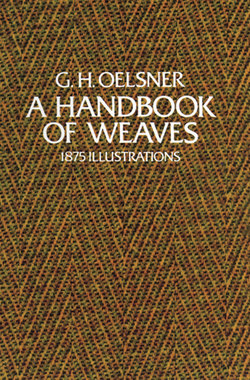Описание книги
To anyone concerned with the design of fabrics, the structure of the cloth is, of course, of prime importance for achieving best results and most satisfying ultimate appearance. Oelsner's A Handbook of Weaves, long the most reliable and comprehensive source of information on the subject, will save you hours of research work and offer information necessary for new cloth effects. It covers the field thoroughly from the simple draft and plain weave to the more complicated fancy weaves, with a clear, lucid text and with 1,875 working diagrams.Just a few of the many weaves fully explained, differentiated, and illustrated in this volume are irregular, double-stitched, and filling satins; basket and rib weaves; steep, undulating, broken, offset, corkscrew, interlocking, herringbone, and fancy twills; honeycomb and lace weaves; tricot and metalassé weaves; corded, piqué, and kersey weaves; and literally hundreds more.The outstanding section on crépe weaves (over 45 pages, 342 weaves) explains 10 different methods, including arranging other weaves, rearranging warp threads, interlocking a weave over another, drafting a weave in four squares, and transporting weaves in checkerboard order.One of the work's most valuable features, particularly to the manufacturer, is in the section which shows with text and picture how from a simple swatch of material one may obtain the full details of construction and layout of any fabric made: weave and color patterns, number of threads per square inch, weight of cloth, sizes of warp yarn and filling yarn, etc.A full chapter is given showing how interesting effects may be obtained by arrangement of yarns in contrasting colors in either warp or filling or both, and how effects can be produced by combining weave and color patterns in the same cloth. A large number of examples, with 207 diagrams, show color effects in twills, basket weaves, crépes, etc.Other topics covered here that are rarely found in textile design books are breaks or recesses in the cloth, weaves that deflect certain threads, broche fabrics, double transposed textures, reform weaves, the determination of the best weaves, the determination of the best types of weave for specific textures and many similar topics.These and many other special features add to this unsurpassed collection's immense value for the textile manufacturer, the designer, the stylist, the hand-loom weaver, the power-loom weaver, and the teacher and student of textiles. It is at once a fully indexed reference, a lucid «how-to-do-it» book, and a storehouse of unusual information and practical suggestions.Includes a supplement on the analysis of weaves and fabrics.
